
Since 2020, the Autonomous Port of Douala-Bonabéri (PAD) has significantly reduced its annual dredging costs, cutting expenditures from 10.5 billion to around 5 billion CFA francs per year.
The move, achieved through the creation of the Delegated Dredging Authority (RDD), has reinforced both financial efficiency and Cameroon’s maritime sovereignty.
The RDD, commissioned in 2018 and operationalized in 2020, was designed to internalize the dredging of the Wouri River, a critical artery for the port’s operations.
Samuel Ngondi Eboua, Director General of the RDD, told the Promote trade fair in Yaoundé in February 2024: “The authority is the culmination of a process initiated by the PAD to restore the sovereignty of the State of Cameroon over the maintenance of the main highway for accessing and exiting goods from our country, while reducing the port’s operating costs.”
Between 2005 and 2020, outsourced dredging had cost the port more than 156 billion CFA francs, with multinational operators, including Spain’s Boluda, invoicing an average of 10.5 billion per year.
Beyond financial strain, PAD faced “regular blackmail” from service providers who linked quality to additional payments.
Now fully funded and equipped with its own fleet, including modern units from international manufacturers, the RDD ensures continuous maintenance of the river channel, docks, and quays.
It guarantees a minimum depth of seven metres, restores design depths along quays, and maintains equipment while adhering to environmental standards.
The authority also has a commercial role, selling services and dredging residues to generate additional revenue.
The financial impact is substantial.
Annual savings of 5.5 to 6 billion CFA francs free up resources that could finance other port or logistics infrastructure.
Beyond economics, the initiative restores national control over a strategic lifeline, essential not only for Cameroonian imports and exports but also for landlocked neighbours such as Chad and the Central African Republic.
“Dredging the Wouri is not a technical detail; it is vital to the survival of the Port of Douala-Bonabéri and the regional supply chain,” the PAD management emphasized. The move exemplifies how operational autonomy can combine economic efficiency with strategic national interests.



